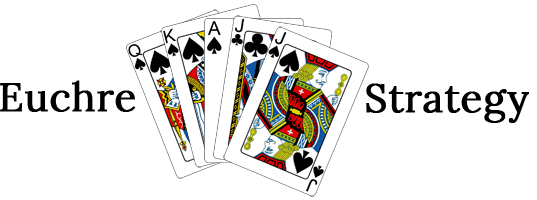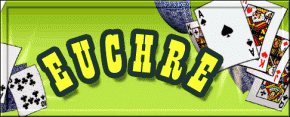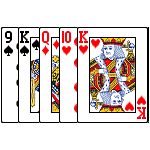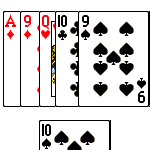Euchre is a positional game, perhaps more than other card games. The up-card provides information during the bidding process. This information will increase or decrease the relative strength of your hand. Position is determined by the dealer. The player sitting to the left of the dealer is called first seat or first base. The dealer’s partner is called second seat. The player sitting to the right of the dealer is called third seat.
There are two axioms to consider when applying positional strategy in euchre. The first is the rank of the up-card, and the second is the aggressiveness of your opponents. The higher the rank of the up-card and the more aggressive your opponents are at bidding, it will greatly increase or decrease the relative strength of your hand.
First Round
First Seat
The first seat is a difficult place to call trump. It has has the least amount of information to call. It gives the dealer a trump card and the ability for him to create voids. On the other hand, the first seat has the ability to lead the first card, which has its obvious advantages.
To order up from the first seat, you should be holding a nice hand. Since the dealer has an improved hand, it is useful to have an extra trump or ace. If the first seat is going to call, going alone should be strongly considered.
Second Seat
If you are sitting in the the second seat, you should instinctively try to call trump, because it would give your partner a trump card. This advantage enables the second seat to call riskier hands than normal. The only exception to calling a biddable hand from the second seat is outlined by the Eighth Commandment of Euchre: Ordereth not the right bower unto thy partner’s hand unless thou canst go alone.
Third Seat
Do not call from this seat unless there are three guaranteed tricks, otherwise pass. The third seat is the hardest seat to call, because you improve the dealers hand, and you must rely on your partner to lead trump. In addition, the dealer can easily finesse at least one trick, and thus making it harder to win from this seat.
Dealer
If you are the dealer, you should instinctively bid trump. The dealer is technically playing with 6 cards, and inherently, the seat has the most flexible hand. You can easily create voids, or discard the least valuable card. Even slightly risky hands should be considered, because it doesn’t allow the player sitting in the first seat to name trump.
Second Round
First Seat
After the dealer has turned down the up-card, a lot of information has been gained. The first seat has gained that the opposing partnership is weak in the same color suit as the up-card. If the two players are weak in one color, then they are likely stronger in the color opposite of up-card. Therefore, the first seat, when possible, should call trump in the “next suit”. This is called a next strategy. The stronger the up-card, the more effective it is to call next. If you call trump in a color other than next, do not expect a lot of help from your partner.
Second Seat
The second seat should adopt a “reverse next strategy”. If your partner couldn’t call trump with the up-card, your partner is likely weak in the same color as the up-card. Therefore, you should call trump in color opposite of the up-card, often called “reverse of next” or simply “reverse next”. Calling trump in the next suit can be done, but don’t expect any help from the dealer.
Third Seat
If you are sitting in the the third seat, you should adopt a “Second-chance Next Strategy.” In general, your partner wanted to call next, but their hand may have been to weak to call. So the third seat has another opportunity to call next. Your partner will likely have one or two cards in the next suit, and therefore it would make it easier for your partner to lead trump. Calling trump other than next is very risky.
Dealer
If the bidding has comeback to you for a second time, you should adopt a “Second-chance Reverse Next Strategy.” In general, your partner wanted to call a suit reverse of next, but their hand may have been to weak to call. So you have another opportunity to call reverse next. It also should be noted that the cards are very evenly distributed, and the Aces will likely go around the table without being ruffed. If the dealer’s is too weak to call a “Second-chance Reverse Next” suit, simply pass, but if you are playing stick the dealer, you should pick trump which maximizes the number of trump cards and off suit Aces.








 and 10
and 10 in hopes that you could someday play the K
in hopes that you could someday play the K creates a void in diamonds. This maximizes your chances to
creates a void in diamonds. This maximizes your chances to 







 .
. .
.


